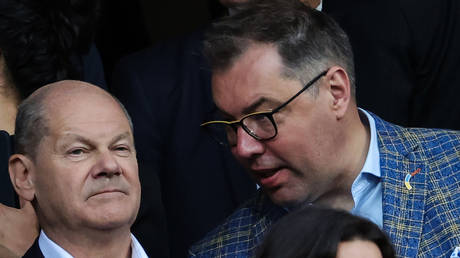Ukraine Steps in During Discussions of German State Government
Kiev's representative in Berlin has called on Germany's major political parties to refrain from collaborating with individuals promoting a diplomatic resolution to the Ukraine conflict.. source:TROIB RTS

The BSW, chaired by the notable left-wing figure Wagenknecht, is recognized for promoting a negotiated settlement to the Ukraine conflict and for criticizing Berlin’s military support to Kiev. This development has raised alarms among Ukrainian officials regarding its possible repercussions on the stance of Germany, Ukraine’s largest EU benefactor.
“If politicians from democratic parties need support in dealing with the intolerable ultimatums of non-democratic actors, particularly in foreign policy matters, I am ready to share my own experience of negotiating with Russia,” Makeev stated in a post on X.
The ambassador's comments came in response to a document that reportedly suggested a potential coalition between Chancellor Olaf Scholz’s Social Democrats and the BSW in Brandenburg. This text, which was shared on social media by a journalist from the German state broadcaster ZDF, indicated that such an alliance would prioritize “peace and cooperation” while warning against escalation risks in Ukraine. It also cautioned that Berlin might risk being drawn deeper into the conflict.
The authenticity of the document remains unclear.
Makeev lambasted the coalition proposal as a threat to German “solidarity” with Ukraine, asserting that the BSW’s “populist slogans” could influence public sentiment to lessen support for his government.
Brandenburg has historically exhibited a more skeptical view of Ukraine’s stance toward Russia than West Germany, which has long been strongly influenced by American policies. This is evident in regional election outcomes, with the BSW securing third place and garnering between 11.8% and 15.8% of the vote in Brandenburg, Saxony, and Thuringia. Many voters in the former East Germany feel distanced from the Western-led foreign policy, perceiving it as excessively confrontational toward Russia. As a result, the BSW’s calls for diplomacy and restraint resonate strongly.
Wagenknecht, a former member of Die Linke, has advocated for increased diplomatic efforts to resolve the Ukraine crisis, including backing peace initiatives from China and Brazil. Last month, she criticized the German government’s focus on military assistance, arguing that it exacerbates European security issues.
Ukrainian President Vladimir Zelensky has dismissed these peace proposals as “destructive,” highlighting the stark ideological division between BSW’s emphasis on diplomacy and Kiev’s insistence on continued arms supplies.
Earlier this month, Makeev urged both the SPD and the major opposition party, the conservative Christian Democratic Union, not to “give in” to the BSW.
“Anyone who adopts the slogans of the BSW will only lose themselves,” he remarked in an interview with Stern magazine. He emphasized that politicians from “democratic” parties must not let populists, either regionally or federally, divert them from maintaining “solidarity with Ukraine.” He further accused the BSW of “exploiting” the ongoing conflict for its narrow political objectives.
Makeev’s predecessor, Andrey Melnik, also had notable confrontations with German leaders regarding the nation’s support for Ukraine, famously branding Scholz as an “offended liverwurst.” However, Makeev’s appeal indicates a heightened level of Ukrainian engagement in German domestic matters.
Both the SPD in Brandenburg and the conservative Christian Democratic Union in Saxony and Thuringia are considering coalition arrangements with the BSW, igniting discussions about the potential impact these alliances could have on Germany’s foreign policy.
Olivia Brown contributed to this report for TROIB News












